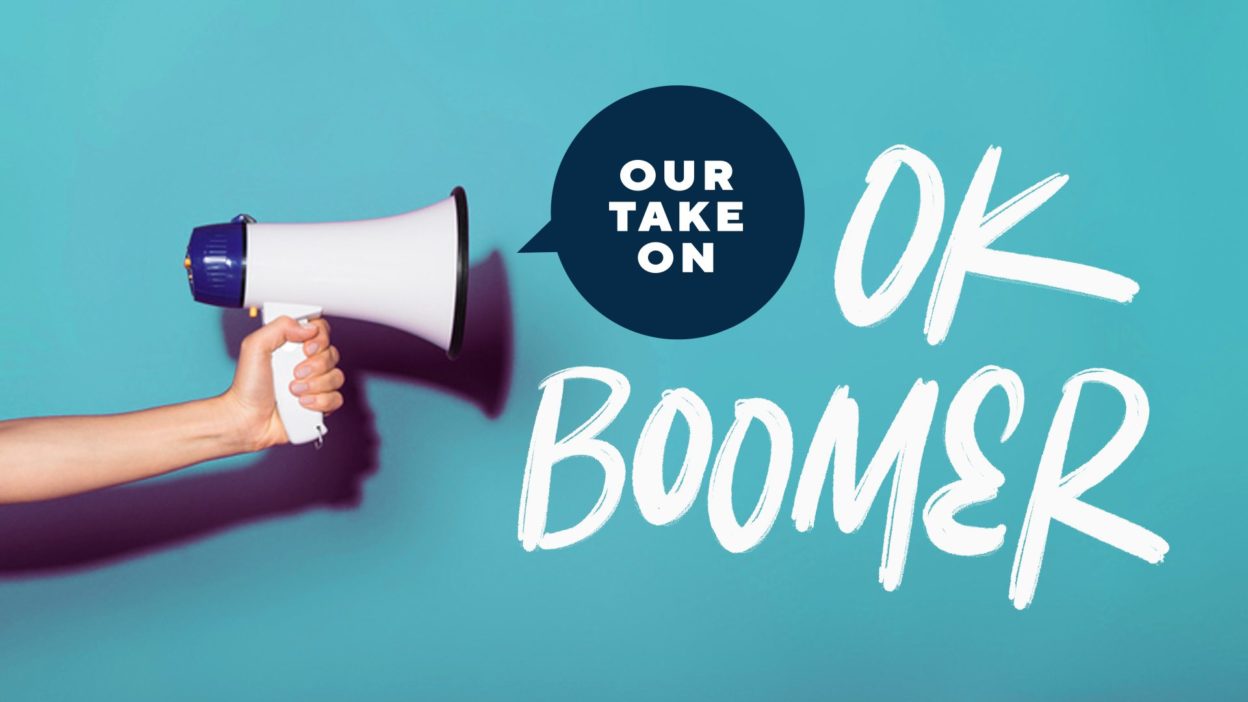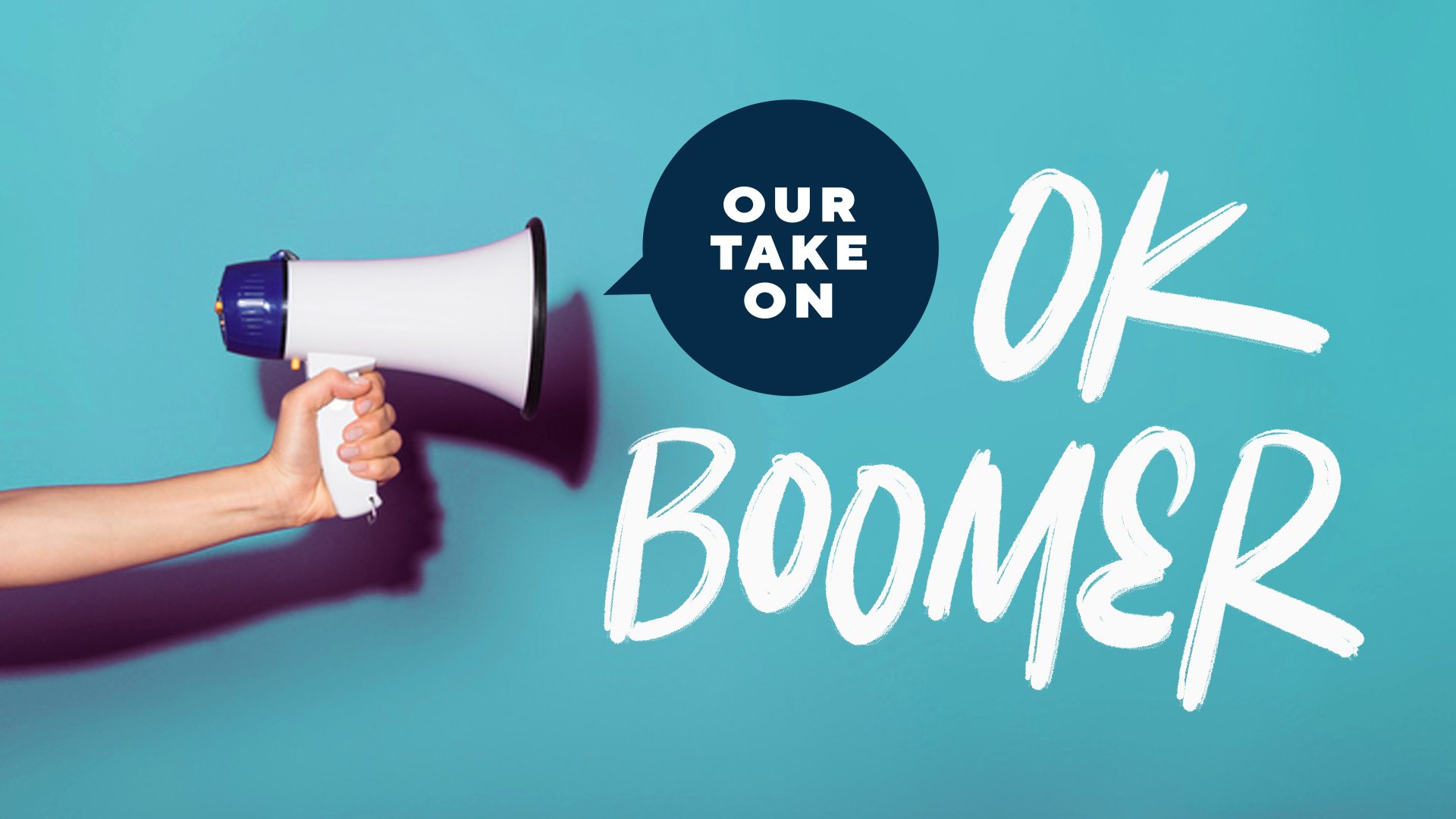
An open letter to those born between 1965 and 2013.
I’ve been asked recently by more than one media organization to weigh in on the “OK, Boomer issue.” Of course, the request is little more than a lightly veiled effort to sow more seeds of division in an already divided culture, to pit an entire demographic cohort against another for the amusement of readers or viewers.
Yes, please. Let me participate in a deeply-polarized debate in which facts don’t matter and let me be misquoted by someone only interested in “a good story.”
But now that an AARP Senior Vice President has offered the tone-deaf response, “Okay, millennials, but we’re the people that actually have the money” I feel compelled to weigh in. Her comment was tone deaf because it totally ignores some very serious and legitimate concerns and because the boomer demographic is, in many ways, the most diverse of all-time containing both wealth and poverty, health and sickness. And that’s just the beginning of the extreme differences in this and every other demographic cohort. Her answer simply reinforced the out of touch stereotype that’s being put forth by the OK, Boomer “movement.”
In the unlikely event that you’ve somehow missed the story that is igniting generational warfare because the media continues throwing gasoline on it, here’s a short summary: “OK, Boomer” has become a flippant and dismissive response from Generation Z and millennials who see baby boomers as out of touch. It’s a bit more than the latest version of “whatever.” It’s demeaning shorthand for, “You’re a narrow-minded, self-centered, a**hole.” Don’t believe in climate change? “OK, Boomer.” Think all young people are lazy and lack ambition? “OK, Boomer.”
Social scientists tell us that we’re actually hardwired to make snap judgments about others based solely upon how they look. This self-preservation mechanism originated hundreds of thousands of years ago when our survival was dependent upon first impressions. Friend or foe? Help or hurt? Fight or flight? Unfortunately, for some, this biological imperative has devolved into an excuse for ignorance and a justification for bigotry.
Stereotyping is something that some people of all ages, races, genders, socio-economic status, sexual preferences, and religious backgrounds engage in. It’s an equal opportunity human character flaw that we can no longer afford. The world is too interconnected and resources are too limited for an us vs. them mentality. The ripples of alienation spread quickly.
To make this latest intergenerational smack down something that can grab and hold our increasingly divided attention, the media is only too happy to paint both sides with a single brush. Anyone who does this (no matter their age) is ignorant and any media organization that does it is irresponsible.
I will be the first to agree that there is truth to the litany of complaints that Gen Z, Gen X and millennials are expressing. There are far too many men and women born between 1946 and 1964 who deny climate change, who care more about their financial security than that of their grandchildren, and who behave selfishly in nearly every aspect of their lives. But there are also many of us that agree that rising student debt, political corruption, economic inequality, and leaving behind a planet that’s choking on man-made pollution are disastrous for everyone.
It’s also important to remember that many born between 1946 and 1964 have waged war for decades on gender equality, civil rights, gay rights, equal pay, and access for those with disabilities. And now we’re fighting ageism.
Let’s acknowledge that every demographic cohort has self-centered, materialistic, resource hoarders as well as compassionate, creative, empathetic, thoughtful stewards of the planet. It’s not when you were born. It’s who you are. The answer to today’s serious problems is not generation shaming. It’s the exact opposite. It’s ignoring generational branding altogether which is why Growing Bolder never uses the word baby boomer. It’s not that we’re afraid of it. It’s simply that it’s a very poor descriptor, a convenient and gross generalization that has no real value.
Our mission is not focused on any demographic cohort. We’re focused on providing the inspiration, the tools and the resources to help anyone figure out what’s next in their life. We’re focused on educating adults of all ages about an entirely new life stage that offers the opportunity to live with passion, purpose and significance for 2 or 3 decades beyond what’s considered normal retirement age. And, yes, we’re fighting for the right to continue contributing. This is not simply a selfish desire. It’s an effort to change outdated norms. It’s great news for everyone of every age because it will benefit every older person, of every generation, forever.
We’re proud and grateful that we have a large and passionate following among younger women and men. They bring great value, insight and energy to our movement, which is also their movement because growing older is something we’re all doing, if we’re lucky. I don’t want to be the guy that tells young people to get off my lawn. I want to be the guy that invites them inside. I need them. I am energized by them. I am inspired by them. And I believe I have something to share with them. Together we’re much stronger. Only together we can effectively attack the issues that result in unfairness and inequity. Only together we can battle corporate greed, polarized politics, and selfish behavior. The power of intergenerational connection and cooperation is limitless.
Generational name calling in an effort to sell merchandise or newspapers is small ball. It’s for little minds. To paint everyone within a demographic cohort with the same brush is as ridiculous, damaging, dangerous and ignorant as saying all men are misogynists, all immigrants are criminals, or all police are corrupt.
Empathy for others and the desire to do the right thing are not qualities exclusive to any generation. They are qualities expressed by many in all generations. They are the glue that holds society together.
It’s not easy to be an older adult in today’s society. It’s not easy to be a young adult in today’s society. We are natural allies because no one, no matter their age, has the right to hoard resources and opportunity. And everyone, no matter his or her age, has the right to work and grow. There are serious issues that need big solutions. Passive aggressive, sarcastic, flippant behavior won’t solve anything. What it will do is what it’s doing right now: sell a few t-shirts and newspapers.
Let’s start looking for the good in others – no matter what generation they happened to be born into. Let’s start working together instead of letting small minds with ulterior motives divide us on important issues.
Ok, Boomer?
Marc Middleton, Founder and CEO of Bolder Broadcasting and Growing Bolder, is a media entrepreneur, television journalist, author, film maker, speaker, activist, and consultant who focuses on the changing culture of aging. A multiple Emmy Award-winning broadcaster, Marc is the host of Growing Bolder TV seen on public broadcasting stations nationwide, co-host of Growing Bolder Radio, executive producer of Surviving & Thriving TV, editor of Growing Bolder Magazine, and director of the Emmy Nominated documentary film, Conquering Kilimanjaro. Marc is a 7-time Masters Swimming world record holder and a 10-time U.S. Masters Swimming national champion. His new book, “Growing Bolder, Defy the Cult of Youth, Live with Passion and Purpose” is now available.













